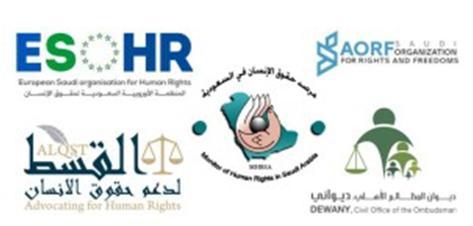
With the start of the 31th session of the United Nations Human Rights Council (UNHRC) held in Geneva, and in the light of ignorance and full deception practiced by the Saudi authorities against the civil society in Saudi Arabia, each of the Saudi Organization for Rights and Freedoms, the Saudi European Organization for Human Rights, Advocating for Human Rights in Saudi Arabia, Diwani al-Ahli Organization, and Monitor of Human Rights in Saudi Arabia, seek to clarify the truth about the new system of the Saudi civil associations and institutions. This step comes as an expression, through which the mentioned organizations operating from abroad because of the suppression exercised by the authorities against them, to highlight the allegations made against the Saudi civil society and its role on one hand, and the systematic deception it is facing on the other hand.
As usual, the speech of the Saudi delegation headed by President of the Human Rights Commission, Dr. Bandar bin Mohammad Al-Aiban delivered to the Human Rights Council, indicated to some achievements, including the issuance of the system of associations and civil institutions, ignoring the series of extensive violations against the civil society, not least, the refusal of the authorities until now to register the human rights organizations, which makes those affiliated with them exposed to criminal trials on charges of “participating in the establishment of unlicensed associations”.
This system (the law) issued by the Council of Ministers in November 2015, remained useless for seven years, in which many human rights defenders and activists have paid high cost for it and they are still yet subject to arbitrary attests on charges of establishing unlicensed organizations. In the light of the lack of official warrantees guaranteeing the freedom of expression and opinion in the country, and the non existence of a written law which defines the limits of these freedoms, the two mechanisms of the Universal Periodic Review (UPR) of the HRC for the years 2009 and 2013, witnessed official pledges from the Saudi authorities to support many recommendations of the participating countries. Hence, more than 15 countries have focused on allowing the civil society organizations to operate freely and independently, as well as on the necessity to accelerate the issuance of laws to allow for the legal creation and registration of non-governmental associations and organizations.
As for the system which the Saudi delegation was proud of in the international human rights forums, it does not meet the aspirations and hopes of building an active civil society which participates in making decisions and legislations. That is because, first, it granted the government the power to dissolve or replace the board of directors of any associations based on broad justifications such as “violating the public order,” or “contradicting the Islamic Sharia. This new system also stipulated the government approval as a condition for the organizations to receive foreign financing. Second, it makes the process of licensing and registering the associations very difficult because they are all for three governmental authorities.
These statements on the issuance of a new system for associations are just an attempt to encompass the efforts of the Saudi civil society and neutralize it from the human rights work and political participation. What supports this stand is that the new system cancels all what have been proposed in the draft of the old system with respect to allocating the human rights activity as one of the activities through which the associations operating them might be formed.
This is a regression and a continuation to refuse the registration of the human rights associations, and consequently, confiscating the civil society conscience and marginalizing its role in different fields.
In this context, and in the light of the received information, this law proves its ineffectiveness, like many of the laws passed, especially because it came in a muzzled civil society which is unauthorized to participate in the legislative process or through democratic mechanisms.
In order to compensate this marginalization suffered by the civil society, we, the above-mentioned organizations are working on clarifying the reality of the of human rights movement, especially during the 31the session of the UNHRC held in Geneva, and we call for the use and follow-up of the hashtag # HRC31SAUDIA to refute the floating phrases launched by the speeches of the Saudi delegation regarding the achievements in various fields, especially about activating the role of the civil society.
